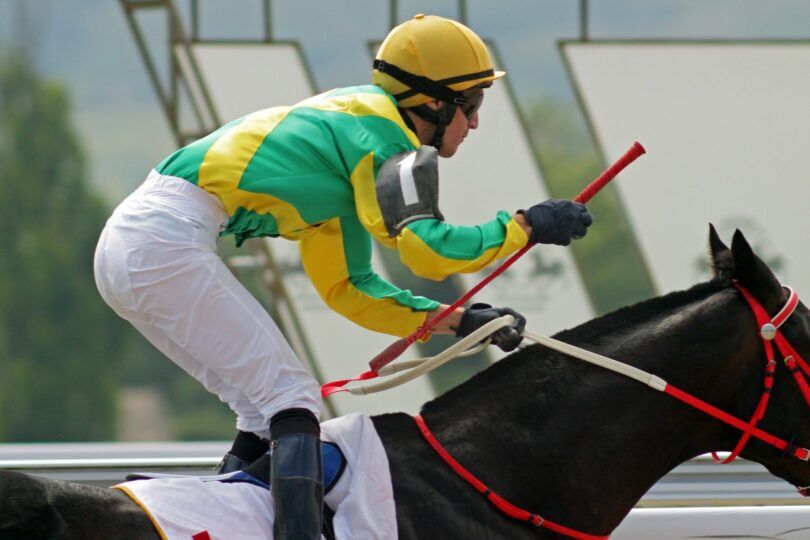Small Yet Mighty
Have you ever heard the saying, “jockeying for position” and wondered where it came from?
Jockeys are the people who ride horses in racing competitions. They are generally small in stature (between 4’10” and 5’7”) but very strong, as they are responsible for piloting large animals at high speeds.
Photo Cred: Canva
The Jockey: Job Description
A jockey is someone who rides horses in racing competitions for a living. These self-employed people must be light yet physically fit to perform their jobs. They are also heavily involved in their mount’s health during competition.
What do horse jockeys do?
Jockeys are quick-thinking and observant people who ride horses in races, either on the flat or over fences (steeplechases).
Their job is both physically and mentally demanding, as they must pilot a 1,000+ lb animal at high speeds while maneuvering through a field of horses to win a race.
A “Day in the Life” of a Jockey:
Jockeys follow similar routines on both race days and non-racing days. A typical day might start around 5 AM with breakfast.
They will generally keep their meals small so they maintain a good racing weight.
From there, they head to the track in time for daily workouts to begin. For example, Keeneland’s main dirt track is open seven days a week from 5:30 AM to 10 AM with two breaks for renovation (required by law to keep the surface fresh and minimize injuries).
Races occur on weekdays as well as the more popular weekends. If a jockey has mounts on a particular day, he or she must get to the locker room to change into designated owner silks. These silks help the audience and announcer identify the horse during the race. Jockeys must be weighed before the race and again after to make sure no one is cheating.
A jockey usually works long, 12-14 hour days.
Often, horses are a small part of the day. Jockeys often meet with trainers, agents, and stewards to go over their riding as well.
Photo Cred: Canva
Jockeys: A Physical Description
Despite being small, jockeys have to control large creatures running at top speeds. Because of this, they need to be physically fit.
Why jockeys are short
While there isn’t a height requirement (or minimum) for jockeys, there is a weight requirement. This makes it tougher for a taller person to become a jockey, as they will have a more difficult time meeting the weight requirement.
Horses have an assigned weight during races, and the lightest weight (including tack) is 115lbs.
Average height of a jockey
Typically, jockeys are between 4’10” and 5’7”.
Average weight of a jockey
Jockeys generally weigh between 108lbs and 118lbs.
The ratio of male jockeys to female jockeys today
As of 2021, males make up about 68% of the jockey population.
Photo Cred: Canva
Frequently Asked Questions
Q: How tall was the shortest jockey?
Kenneth Glover was 15-years-old and stood at 4 feet tall.
Q: How tall do you have to be to be a jockey?
While there are no height requirements, the weight requirements are hard to meet if over a certain height.
Q: What is the average age of a horse jockey?
A person has to be a minimum of 16 years old to apply for a jockey license. The oldest jockey to still compete at the highest levels was 58 years old (Bill Shoemaker). The average age in this profession is currently about 40 years old.
Q: What does “make weight” mean for jockeys?
Just like a wrestler, jockeys have to maintain a certain weight for their mounts. Horses are assigned a weight to carry for each race. Sometimes horses are “handicapped” with more weight to help even the playing field. Some horses get a benefit and have to carry less. Jockeys don’t want to add any weight to their ride, and they can be replaced if they weigh more than what the horse is designated to carry.
Parting Thoughts
Being a jockey is a demanding job both physically and mentally. It carries a big risk with every ride, both to the horse and the rider. It can, however, be lucrative as well. There are designated jockey schools, like the Hall of Fame jockey Chris McCaron’s racehorse riding school. The North American Riding Academy is offered through the Bluegrass Community and Technical College, Equine program, and is a community college-based certificate for those interested in becoming a jockey.
P.S. Enjoy this article? Trot on over to:
- Furlong Fashion Guide: What to Wear to a Horse Race
- Off to the Races: How to Fit in at the Horse Track
- Say Yes to the Horse: 11 Best Breeds for First Time Horse Owners
- Elevate Your Ride With These 6 Tall Horse Breeds
- Friendly and Fun: 4 Best Horse Breeds for Beginners
- Stay Calm and Ride On: 5 Calmest Horse Breeds
- Heavyweight Champs: 5 Best Horses for Larger Riders
